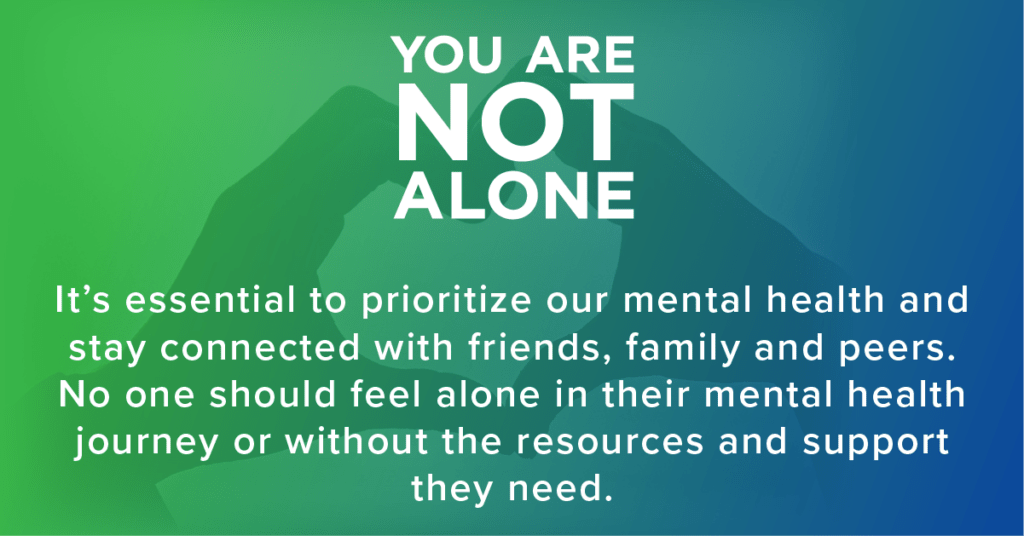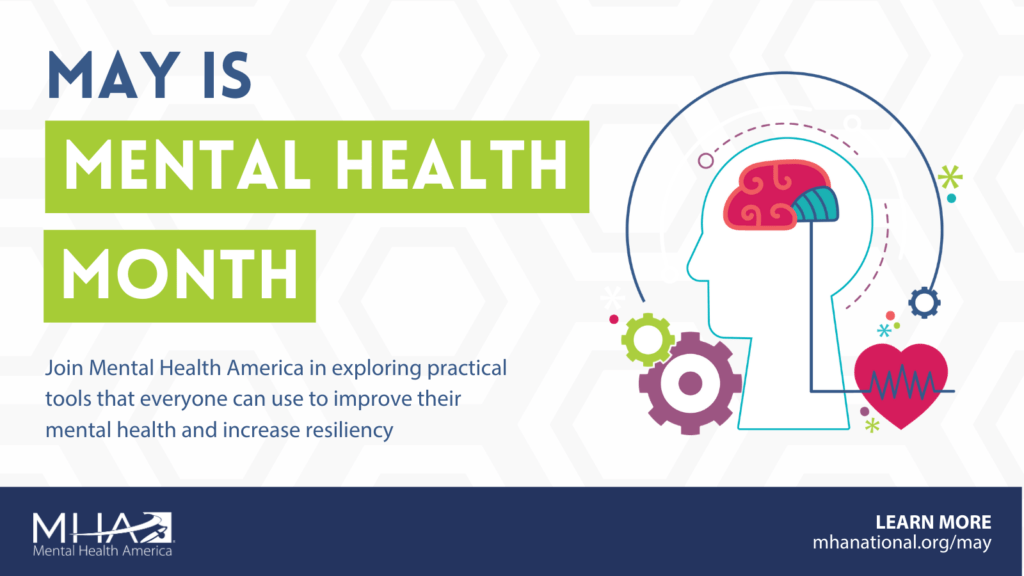Did you know that May is Mental Health Month?
It’s an annual event designed to spread the word that mental health is important. It provides a platform to raise awareness of mental health, educate the public on mental health issues, and distribute materials to participate in Mental Health Month.
As we find ourselves in the prolonged wake of the COVID-19 pandemic, this observance is an important and timely one.
Last year, we explored pandemic-induced stress and the impact it can have on our mental health. Luckily, a year can make quite a difference. There’s now a better understanding of the emotional and mental toll that COVID-19 has had on all of us.
However, there is still much work to be done and lots of progress to be made. The stigma associated with mental health has shrunk considerably in recent years, yet it still persists. Read on to learn how to participate in Mental Health Month to fight that stigma with awareness, education, and connection!
May is Mental Health Month
Mental Health Month is now a nationally recognized awareness month, but its origins can be traced back to 1949. That was the first year that Mental Health America (MHA) observed May is Mental Health Month.
Since then, MHA and its affiliates have celebrated each year by reaching out to the public through the media, community events, and screenings.
With such a long history of advocating for these issues, it’s no surprise that MHA offers the most comprehensive Mental Health Month toolkit available today. This year, they’ve chosen the theme, Tools 2 Thrive, because MHA is committed to providing practical tools to help people improve their mental health.
If you’re looking for a way to participate in Mental Health Month, this toolkit is the perfect place to start.
What’s in the Toolkit?
The Tools 2 Thrive Outreach Toolkit covers a wide spectrum of mental health topics in its 29 pages, including:
- Outreach ideas
- Social media package
- Shareable images for spreading awareness
- A variety of additional resources from around the web
- Accepting Reality: How to fully accept your reality in situations you can’t control.
- Adapting After Trauma and Stress: How to become more resilient in preserving your mental health after difficult experiences.
- Dealing With Anger and Frustration: How to decrease your overall mental and emotional tension to prevent your feelings from spiraling out of control.
- Getting Out Of Thinking Traps: How to avoid falling into negative thinking patterns.
- Processing Big Changes: Learn to process both expected or unexpected changes and how to adapt more easily.
- Taking Time For Yourself: How to make self-care a little bit easier.
Mental Health Month 2021
MHA’s efforts are certainly extensive and admirable, but they aren’t the only organization doing great work in mental health.
The National Alliance on Mental Illness (NAMI) strives to provide advocacy, education, support and public awareness so that all individuals and families affected by mental illness can build better lives.
For Mental Health Month, NAMI is championing the message “You Are Not Alone.” It’s an especially relevant and truthful sentiment to keep in mind and act on as we navigate our mental and emotional health.
This year, NAMI is focusing on two key messages: the fact that we can heal through connection and the acknowledgement that it’s okay to not be okay. Those messages ring particularly true after the year we’ve all had.

The National Council for Mental Wellbeing is another organization leading the mental health charge. They’ve created a program called Mental Health First Aid (MHFA) that teaches you how to, “identify, understand, and respond to signs of mental illnesses and substance abuse disorders.
The National Council likens their MFHA course to CPR training or a medical first aid course. Individuals that go through CPR training learn how to identify when they must administer CPR and how to initiate and perform that technique.
The MHFA program is designed to teach individuals how to properly identify and address a potential mental illness.
Mental Health First Aiders are taught how to start a dialogue about mental health and how to support someone dealing with mental health challenges. By equipping more people with these skills, more people will be able to get the help they need. In that sense, the MFHA training can be just as life-saving as a CPR certification.
Mental Health Awareness is An Ongoing Effort
The organizations and programs discussed in this article are huge components of our industry’s effort to raise awareness of mental health issues and increase access to quality care.
However, we can’t allow these big players to be the only players. Some of the most meaningful work occurs at the individual level.
By educating ourselves about mental health, learning how to support those struggling with their mental wellbeing, and applying that knowledge and those skills in our immediate communities, we can truly bolster the collective efforts of our industry.
As with any endeavor, the larger and louder the group advocating for a cause, the sooner a lasting impact can be made.
Consider this an invitation, or a challenge, to take a larger part in spreading awareness of mental health and mental health issues. As a part of the behavioral health industry, we are the ones that must lead this critical, ongoing undertaking.
A great way to participate in these efforts is by further educating yourself on mental health and mental health related issues.
Sigmund Software and Commonly Well recently presented a webinar called COVID Clarity: How The Pandemic Confirmed the Importance of Recovery Capital. It explores how COVID-19 has highlighted the need to consider addiction as a condition that is rooted in dynamic forces, such as one’s personal and professional life, as well as their mental health.
Click the link below to learn more about the intersection of addiction, mental health, and COVID-19!
COVID Clarity: How The Pandemic Confirmed The Importance of Recovery Capital
Watch Now!

